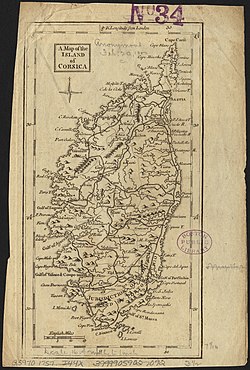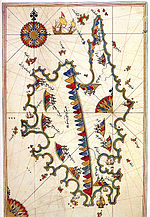Corsican Republic | |||||||||
|---|---|---|---|---|---|---|---|---|---|
| 1755–1769 | |||||||||
| Motto: Amici e non di ventura (English: Friends, and not by mere accident) | |||||||||
| Anthem: Dio vi salvi Regina ("God save you Queen") | |||||||||
 Corsica in 1757 | |||||||||
| Status | Unrecognized state | ||||||||
| Capital | Corte | ||||||||
| Official languages | Italian | ||||||||
| Common languages | Corsican | ||||||||
| Government | Modified parliamentary constitutional republic
| ||||||||
| General | |||||||||
• 1755–1769 | Pasquale Paoli | ||||||||
| Legislature | General Diet | ||||||||
| Historical era | Age of Enlightenment | ||||||||
• Independence declared | July 1755 | ||||||||
| 18 November 1755 | |||||||||
| 15 May 1768 | |||||||||
| 8–9 October 1768 | |||||||||
| 9 May 1769 | |||||||||
| Currency | Soldo | ||||||||
| |||||||||
| Today part of | France ∟ Corsica | ||||||||
| History of Corsica |
|---|
 |
|
|
The Corsican Republic (Italian: Repubblica Corsa) was a short-lived state on the island of Corsica in the Mediterranean Sea. It was proclaimed in July 1755 by Pasquale Paoli, who was seeking independence from the Republic of Genoa. Paoli created the Corsican Constitution, which was the first constitution written in the Italian language. The text included various Enlightenment principles, including female suffrage,[1] later revoked by the Kingdom of France when the island was taken over in 1769. The republic created an administration and justice system, and founded an army.
- ^ Lucien Felli, "La renaissance du Paolisme". M. Bartoli, Pasquale Paoli, père de la patrie corse, Albatros, 1974, p. 29. "Il est un point où le caractère précurseur des institutions paolines est particulièrement accusé, c'est celui du suffrage en ce qu'il était entendu de manière très large. Il prévoyait en effet le vote des femmes qui, à l'époque, ne votaient pas en France."

